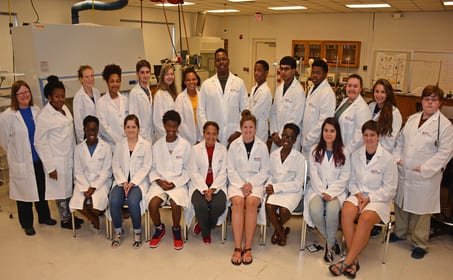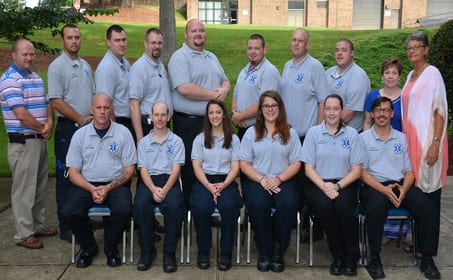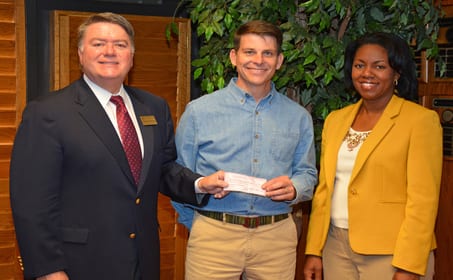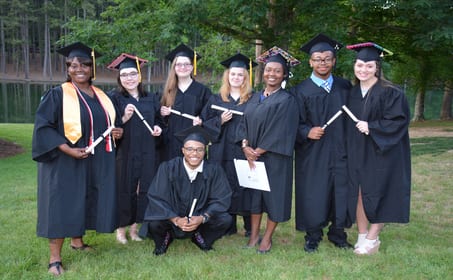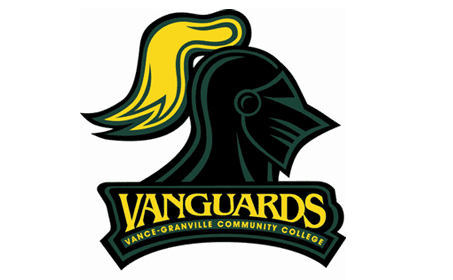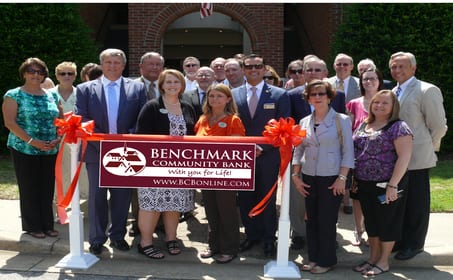High School students explore health and science at two VGCC campuses
High school students from across the region recently attended “Mini-Medical School” camps organized by the Wake Area Health Education Center (AHEC) in partnership with Vance-Granville Community College. The camp was held first in June at VGCC’s South Campus, located between Butner and Creedmoor, and in July at the college’s Franklin County Campus, just outside Louisburg. Between the two locations, 44 students completed the program.
This was the college’s third summer partnering with Wake AHEC on the Mini-Medical School, which is an intensive, week-long day camp that uses computational science (computer simulation) and hands-on activities to study key aspects of medicine.
Students learned about topics that included anatomy and physiology, bioprocessing, biochemistry, pharmacology, cardiology, epidemiology, medical genetics and genomics. The course was taught primarily by Becky Brady, a registered nurse and chemical engineer. VGCC Bioprocess Technology program head/instructor Dr. Tara Hamilton also taught a session at each camp.
Faculty members from VGCC programs that prepare students for health-related careers — including Nursing, Medical Assisting, Radiography, Pharmacy Technology, Human Services Technology, and the college’s newest program, Histotechnology — gave students information about academic pathways and employment prospects and conducted hands-on activities on the last day of the camp.
Students not only had a chance to learn about careers and hone their science skills, but they also became certified in CPR and Youth Mental Health First Aid during the course of the program.
The students who completed the school at South Campus included Naim Bell and Sai Dasari, both of Apex Friendship High School; Koen Winemiller and Kiran Winemiller, both of Cary Academy; Gracie Athus of Cary Christian School; Sarah Flexman of Cary High School; Britney Dyck, a home-schooled student from Cary; Leah Paul, a recent graduate of Crossroads Christian School in Henderson; Saarika Virkar of Enloe High School in Raleigh; Sarah Doherty and Ellie Smith, both of Holly Springs High School; Tanay Singhal of the N.C. School of Science and Math; Jordan Bell of North Raleigh Christian Academy; Sri Rayarao of Panther Creek High School in Cary; LeAnn Black and Hannah Bonini, both of South Granville High School; Riley Valencia of Southern Wake Academy in Holly Springs; Aryan Jain of Wake Early College of Health & Sciences; Samaria Lynch and Javia Wilson, both of Warren County High School; Mariam Assaedi of J.F. Webb School of Health & Life Sciences in Oxford; and Rose Vaughan of Woods Charter School in Chapel Hill.
Those who completed the program at Franklin Campus included Edin Medrano and Iris Medrano, both home-schooled students from Creedmoor; Karson Turner of Enloe High School in Raleigh; Rachel Hortman, a recent graduate of Fuquay-Varina High School; Yvon’ne Lyle of Garner High School; Saikiran Devanga Chinta of Green Hope High School in Cary; Jacob Harris of Henderson Collegiate School; Sascha Anderson of Vernon Malone College and Career Academy; Autumn Boone of Middle Creek High School in Apex; Lizzie Leegins and Jillian Radford, both of North Johnston High School; Caroline Pruitt of Sanderson High School in Raleigh; Sabrina Bedard, Nadia Hodges and Amanda McPhatter, both home-schooled students from Wake Forest; Sarah Bryant, Victoria Michel and Malik Pettis, all of Wake Forest High School; Kendall Smith and Brandon Yarborough, both of Wake Young Men’s Leadership Academy; Parker Stantz of Wakefield High School; and Bryson Vick of Warren County High School.
Wake AHEC serves nine counties in central North Carolina from its office in Raleigh: Durham, Franklin, Granville, Johnston, Lee, Person, Vance, Wake, and Warren counties. AHECs are located throughout North Carolina and are affiliated with the North Carolina Area Health Education Centers Program at the University of North Carolina – Chapel Hill School of Medicine. The mission of the statewide AHEC Program is to meet the state’s health and health workforce needs. NC AHEC provides educational programs and services that bridge academic institutions and communities to improve the health of the people of North Carolina with a focus on underserved populations.

